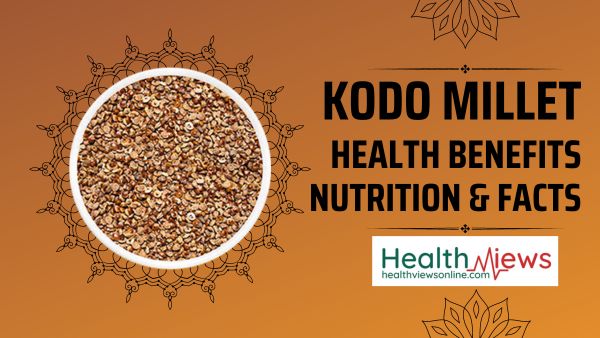Millets are ancient grains that were once considered to be ‘poor man’s food’ but are now being celebrated for their impressive nutritional profile. Unlike wheat and rice, millets are gluten-free and have a low glycemic index, making them an ideal food option for people with celiac disease, diabetes, or those looking to maintain a healthy lifestyle. Moreover, millets are rich in minerals, vitamins, and dietary fiber, and are known to have several health benefits, including weight loss, better digestion, and improved heart health.
What is Kodo Millet?
Kodo Millet, also known as Kodra is a popular type of millet that is native to India. It has been a staple food in several parts of India for centuries, and its popularity has only grown in recent years. This is because Kodo Millet is not only easy to cultivate and cook, but it is also highly nutritious. Kodo Millet is a great source of protein, dietary fiber, and several minerals, making it a valuable addition to any diet.
Different Names of Kodo Millet in Different Indian Languages
Kodo Millet is known by different names in various Indian languages, which reflects the rich diversity of cultures and traditions in the country.
In Tamil Nadu, it is called Varagu, while in Hindi, it is referred to as Kodra. In Telugu, Kodo Millet is known as Arikelu, and in Malayalam, it is called Varagu. In Kannada, it is known as Harka, and in Bengali, it is referred to as Kodon. These regional names highlight the significance of Kodo Millet as a staple food across various Indian states.
Also, Read Health Benefits Of Lemongrass, Medicinal Uses & Side Effects
Kodo Millet Nutrition Profile: The Nutrients Present in Kodo
Let’s have a look at the nutrition profile per 100g of Kodo Millet as provided by Biodiversity for Food and Nutrition (Source):
- 1. Protein 10.6 gm
- 2. Fat 4.2 gm
- 3. Fiber 10.2 gm
- 4. Ash 2.95 gm
- 5. Calorific value 346 kcal
- 6. Carbohydrate 59.2 gm
- 7. Minerals 4.4 gm
- 8. Calcium 27 mg
- 9. Phosphorus 188 mg
- 10. Iron 0.5 mg
HERE ARE SOME OF THE HEALTH BENEFITS OF KODO MILLET:
GOOD FOR DIGESTION
Kodo Millet is a rich source of fiber, which makes it an excellent food for improving digestion and preventing constipation. The fiber in Kodo Millet helps to keep the digestive system healthy and running smoothly by promoting regular bowel movements, reducing inflammation in the gut, and preventing common digestive disorders. Research has shown that fiber-rich diets can help to reduce the risk of colon cancer, heart disease, and obesity, among other health problems. Furthermore, the high fiber content of Kodo Millet makes it a low glycemic index food, which means that it is digested slowly, providing sustained energy and preventing blood sugar spikes.

GLUTEN-FREE
Kodo Millet is naturally gluten-free, making it a safe and healthy food option for people with celiac disease or gluten intolerance. Gluten is a protein found in many grains, including wheat, barley, and rye, which can cause an adverse immune response in some people. For people with celiac disease or gluten intolerance, consuming gluten can lead to symptoms like abdominal pain, bloating, and diarrhea. Kodo Millet is a great alternative to wheat and other gluten-containing grains, as it is not associated with gluten-related health issues. By incorporating Kodo Millet into their diets, people with celiac disease or gluten intolerance can still enjoy a healthy, well-rounded diet, without having to worry about the negative effects of consuming gluten.
RICH IN NUTRIENTS
It is a nutrient-dense grain that is rich in vitamins and minerals, including calcium, iron, magnesium, and potassium. It is also a good source of dietary fiber, protein, and antioxidants. These nutrients are essential for maintaining good health and preventing chronic diseases like heart disease, diabetes, and cancer. By incorporating Kodo Millet into your diet, you can help ensure that your body is getting the nutrients it needs to function properly and fight off illness.
HELPS CONTROL BLOOD SUGAR
Kodo is a low glycemic index food, which means that it is digested slowly and does not cause a rapid increase in blood sugar levels. This is especially beneficial for people with diabetes or those at risk of developing diabetes. Studies have shown that including Kodo in the diet can help improve blood sugar control and reduce the risk of complications associated with diabetes, such as heart disease and kidney damage. The high fiber content of Kodo also helps to regulate blood sugar levels by slowing down the absorption of glucose into the bloodstream.

BOOSTS IMMUNE SYSTEM
It is a good source of antioxidants, which are compounds that help protect the body against damage from free radicals. Free radicals are unstable molecules that can cause oxidative stress and lead to chronic diseases like cancer, heart disease, and Alzheimer’s disease. The antioxidants in this Millet help to neutralize these free radicals and prevent damage to the body’s cells. Additionally, It contains immune-boosting nutrients like vitamin C, zinc, and iron, which help to strengthen the immune system and fight off infections. By including this Millet in your diet, you can help to support your immune system and improve your overall health.
In conclusion, Kodo Millet is a highly nutritious and versatile food that offers a range of health benefits. From aiding digestion to boosting the immune system and controlling blood sugar, it is a great addition to any diet.





